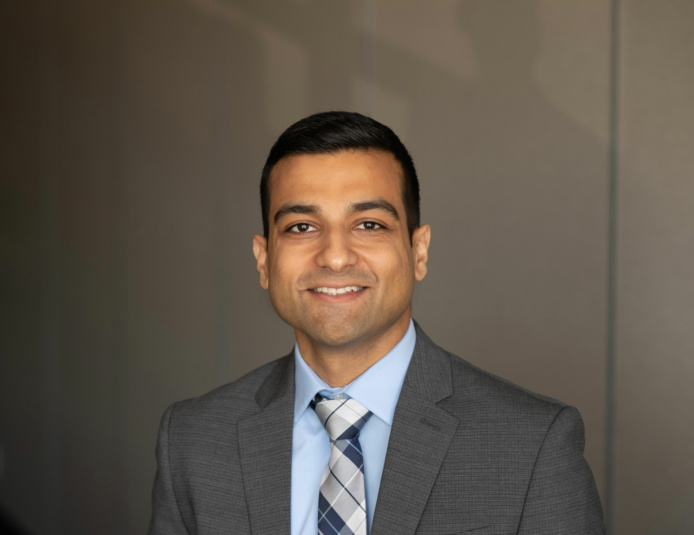Meet Justin Gill, WSNA president

This story appears in the Fall 2023 print issue of The Washington Nurse.

Justin Gill, DNP, RN, ARNP is not only the first person of color and first male president in WSNA’s 115-year history, but at 33 he is also one of the youngest. Gill currently works as an urgent care nurse practitioner at Providence Medical Group in Everett.
Where were you at age 5?
I was in Tracy, California. It’s about an hour south of Sacramento, and an hour east of San Francisco. My mom worked for Comcast. My dad was a trucker. This is where I went to high school and started college at Joaquin Central College.
Where are your parents from?
My parents are from India. My dad grew up in England and my mom grew up in Canada.
What were you like in high school?
I was always told I was the mature adult in the room. I was very focused on setting myself up in the future. I wanted to go to college and law school … then my outlook changed.
I like involving myself in clubs — Key Club (Kiwanis). I had a pretty good high school experience.
How did you get interested in politics?
After I graduated from high school, I had an internship with local congressman Jerry McNerney, a Democrat. McNerney was on Science, Space, and Technology; Armed Services; and Veterans Affairs, among other committees. This was in 2008, during the recession, and this internship was my introduction to the policy world. I was always interested in politics.
Why nursing?
I didn’t see myself in a court room. I was soul searching on what I wanted to do. I wanted good job security and to expand and grow in my career. I wanted to do something meaningful for life fulfillment. My sister was in nursing school at the time, so I could shadow different nurses. I made a decision early on to change to nursing. It had the leadership advocacy I wanted.
When did you move to Washington?
My family moved their trucking company to Blaine in 2009. I transferred to Whatcom Community College (WCC) and finished the nursing prerequisite program, then graduated from UW Bothell with a BSN in 2012.
But you kept going?
Yes, I received my master’s in nursing with a family nurse practitioner focus from Georgetown University. I attended online from 2013-2015 and went to campus a couple times a year.
I became licensed as a nurse practitioner for a year and decided to get my doctorate at Yale in 2016. I attended the Executive Leadership Program online and traveled to campus about once every two months.
How did you first get involved in leadership?
Faculty members at WCC encouraged me to be more active. I was the president of my nursing student organization at WCC. During this time, I also served as vice president on the board of directors for Nursing Students of Washington State.
What is your favorite food?
Mexican food. It’s the easiest kind of food for vegetarians.
What are some of your hobbies?
Family, friends, traveling, hiking. Hiking gives me a mental reset.
What are some lessons you live by?
My perspective on life is that success is demonstrated by solving problems not just getting through life. The ability to get through difficult decisions and do it in a way that is thoughtful is a good way to get through life.
People could use that approach to be more caring and understand different perspectives. We are growing more diverse and more interdependent on each other. We need to understand each other and work together, not divided.
How can nurses help in healing the divide?
The pandemic was a perfect reminder that nursing was cutting through the noise. Nurses’ stories had nothing to do with politics; they had to do with human lives. Nursing can help heal a lot of problems in society. People respect us. We have a really important role to play in the discourse around all aspects of healthcare — whether someone can buy healthy food or live in a safe neighborhood.
One of my biggest motivators is that nursing is the most trusted profession. What do we do with that trust to make changes?
What are your priorities as WSNA president?
To help rebuild our professional footprint in the state of Washington. The pandemic has gone out of public interest, but I feel it’s important to invest in nurses and the infrastructure in healthcare so we can be ready for the next crisis.
COVID-19 was a wakeup call that we were unprepared. We were just getting by. We only have so many nurses, and it takes many things to ensure that nurses will stay in the job. I want to keep nurses in the spotlight, so that they are consulted when big policy decisions come up.
Why did you want to become president of WSNA?
My experience as a member of a WSNA collective bargaining unit, and later as a sustaining professional member, has strengthened my belief that WSNA should be at the table in all health policy discussions in Washington state.

